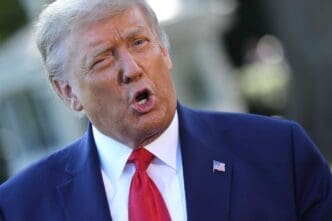Wall Street experienced yet another tumultuous session on Monday, marked by sharp fluctuations in stock prices. Economists are increasingly raising alarm bells about a potential U.S. recession, compounded by President Trump’s threats to intensify tariffs on Chinese imports. The leading indexes saw considerable swings throughout the day. Initial declines in the morning were followed by a brief rebound due to an erroneous report suggesting President Trump might implement a 90-day tariff freeze for all countries except China. However, the market trajectory took another downward turn in the afternoon.
“Could things get worse? Of course they could,” remarked Nate Thooft, a senior portfolio manager at Manulife Investment Management. “We’re not calling the all-clear at all, but when you have this type of volatility in the market, of course you’re going to have back and forth.”
By the close of the day, the S&P 500 had modestly dipped 12 points, or 0.2%, settling at 5,062. The Dow Jones Industrial Average experienced a more significant drop of 349 points, or 0.9%, while the Nasdaq Composite managed a slight gain, inching up by 15 points, or 0.1%. Adam Crisafulli, head of Vital Knowledge, advised investors to exercise caution, noting, “There is more noise than news today, and investors should avoid trying to tie every tick in the (S&P 500) to a headline.”
Monday also saw President Trump intensifying his stance against China via social media, threatening a further 50% tariff on Chinese imports if China proceeds with its plan for a retaliatory 34% import fee on U.S. products. He stated, “Any country that Retaliates against the U.S. by issuing additional Tariffs, above and beyond their already existing long term Tariff abuse of our Nation, will be immediately met with new and substantially higher Tariffs, over and above those initially set.”
Concerns about a recession are mounting amid criticism of President Trump’s tariffs, which investors fear could stymie U.S. economic growth and fuel inflation. Goldman Sachs economists raised the probability of a recession to 45%, citing the surge in tariffs combined with policy uncertainty, waning business and consumer confidence, and signals from the administration suggesting a tolerance for short-term economic setbacks to achieve policy goals.
Markets experienced a significant downturn last week following President Trump’s announcement on April 2 of a 10% global duty on all U.S. imports and “reciprocal” tariffs affecting nearly 90 countries. These trade measures resulted in a dramatic market decline, with the S&P 500 and Nasdaq posting their largest two-day drop since March 2020.
International stock markets also took a hit on Monday, continuing their downward trend from the previous week. Hong Kong’s Hang Seng plummeted 13.2%, its largest drop since the 1997 Asian financial crisis. Taiwan’s Taiex suffered a record 9.7% loss. Other significant declines included Tokyo’s Nikkei 225, which fell 7.8%, the Shanghai Composite which sank 7.3%, South Korea’s Kospi which dropped 5.6%, and Australia’s S&P/ASX 200 which decreased by 4.2%. In Europe, Germany’s DAX index dropped 4.8%, Paris’ CAC 40 fell by 4.8%, and London’s FTSE 100 decreased by 4.4%.
“The near-term future of equity prices depends heavily on Donald Trump’s whims,” commented Thomas Mathews, head of Asia Pacific markets at Capital Economics, in a note to investors. “If he blinks in the face of market moves and/or decides he’s received enough concessions, he could lift some tariffs and sentiment might turn very quickly.”
Your World Now: Navigating Market Volatility and Trade Tensions
- Economic Uncertainty: With rising concerns about a U.S. recession, individuals and businesses should prepare for potential economic instability affecting savings, investments, and job security.
- Inflation Risks: Heightened tariffs could lead to an increase in the cost of imported goods, subsequently driving up prices for consumers.
- Investment Strategy: Market volatility necessitates a careful review of investment strategies to mitigate risks associated with sudden market shifts.
- Global Market Impact: The ripple effects of U.S. trade policies are being felt worldwide, influencing international stock market performance and global economic relations.
- Consumer Confidence: Ongoing trade tensions may erode consumer confidence, impacting spending habits and economic recovery.
- Policy Influence: President Trump’s handling of trade negotiations could significantly alter economic landscapes, necessitating close monitoring of policy changes.







